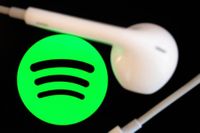On Wednesday afternoon, April 16, 2025, Spotify, the leading music streaming service, faced significant technical issues that rendered the platform inaccessible for approximately two hours. Users from around the globe reported problems accessing their favorite songs, playlists, and podcasts, leading to a flurry of complaints on social media and various outage reporting websites.
Starting around 2 PM, thousands of users began experiencing difficulties with the Spotify app and website, receiving error messages and unable to stream music. The outage was particularly pronounced in the United States and the United Kingdom, according to reports from Techradar and the British news service BBC. As the situation unfolded, the number of reports on the outage tracking site allestörungen.de skyrocketed, with over 10,000 users indicating issues by 2:40 PM. Most of these complaints (76 percent) were related to the mobile app, while a significant portion (20 percent) involved the Spotify website.
Spotify acknowledged the outage on their official social media channels, stating, "We are aware of the issues and are actively working on a solution." In a blog post, the company reassured users that their technicians were addressing the problem, although they did not provide a specific timeline for resolution. The outage was resolved approximately two hours later, allowing users to regain access to the platform.
Interestingly, the timing of this disruption coincided with recent updates that Spotify rolled out just a day prior. On April 15, 2025, the company introduced a new audiobook section, expanding its catalog to include over 350,000 audiobooks in various languages. This update also featured several new functionalities, such as a sleep timer, automatic bookmarks, and an improved search function, aimed at enhancing the user experience. However, it remains unclear whether these changes contributed to the technical difficulties experienced by users.
Despite the inconvenience, many users took to social media to express their frustration, with some humorously lamenting their inability to listen to their favorite tracks. Others speculated about the cause of the outage, with rumors circulating about a potential hacker attack. However, Spotify promptly dismissed these claims, stating, "Reports suggesting a security hack are false." This clarification helped to alleviate some concerns among users, although the incident raised questions about the reliability of the service.
Spotify, founded in 2006 in Sweden, has grown to become the world's most popular music streaming service, boasting over 675 million monthly users. This incident underscores the challenges that come with managing such a massive platform, where even minor technical issues can lead to widespread disruption.
The outage also highlights the increasing reliance on digital platforms for entertainment and the frustrations that can arise when these services fail. As more people turn to streaming services for their music and audio needs, the expectation for seamless access becomes paramount. Users have come to expect that their favorite songs, podcasts, and audiobooks are just a click away, and any interruption can lead to significant dissatisfaction.
In the aftermath of the outage, Spotify's customer service teams were inundated with inquiries from users seeking information about the disruption. Many took to platforms like Twitter and Facebook to voice their concerns, seeking reassurance that their data and accounts were secure and that the service would be restored promptly.
While the technical issues were ultimately resolved, the incident serves as a reminder of the vulnerabilities that digital services face in an increasingly interconnected world. As technology continues to evolve, companies like Spotify must remain vigilant in their efforts to maintain service reliability and address any potential issues swiftly.
Looking ahead, Spotify will likely conduct a thorough review of the incident to identify any underlying causes and implement measures to prevent similar occurrences in the future. As the streaming landscape becomes more competitive, maintaining user trust and satisfaction will be crucial for Spotify's continued success.
In conclusion, while the recent outage may have caused temporary frustration for millions of users, it also presents an opportunity for Spotify to strengthen its infrastructure and enhance its service offerings. As the company navigates the challenges of a rapidly changing digital environment, its ability to respond effectively to such incidents will be key to retaining its status as a leader in the music streaming industry.




